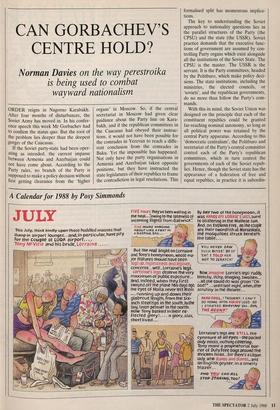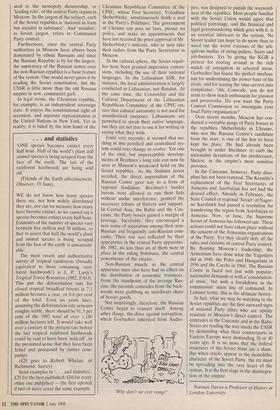CAN GORBACHEV'S CENTRE HOLD?
Norman Davies on the way perestroika
is being used to combat wayward nationalism
ORDER reigns in Nagorno Karabakh. After four months of disturbances, the Soviet Army has moved in. In his confer- ence speech this week Mr Gorbachev had to confirm the status quo. But the root of the problem lies deeper than the deepest gorges of the Caucasus.
If the Soviet party-state had been oper- ating as intended, the current impasse between Armenia and Azerbaijan could not have come 4bout. According to the Party rules, no branch of the Party is supposed to make a policy decision without first getting clearance from the `hisher organs' in Moscow. So, if the central secretariat in Moscow had given clear guidance about the Party line on Kara- bakh, and if the republican committees in the Caucasus had obeyed their instruc- tions, it would not have been possible for the comrades in Yerevan to reach a diffe- rent conclusion from the comrades in Baku. Yet the impossible has happened. Not only have the party organisations in Armenia and Azerbaijan taken opposite positions, but they have instructed the state legislatures of their republics to frame the contradiction in legal resolutions. This formalised split has momentous implica- tions.
The key to understanding the Soviet approach to nationality questions lies in the parallel structures of the Party (the CPSU) and the state (the USSR). Soviet practice demands that the executive func- tions of government are assumed by con- trolling Party organs which exist alongside all the institutions of the Soviet State. The CPSU is the master. The USSR is the servant. It is the Party committees, headed by the Politburo, which make policy deci- sions. The state institutions, including the ministries, the elected councils, or 'soviets', and the republican governments, do no more than follow the Party's com- mands.
With this in mind, the Soviet Union was designed on the principle that each of the constituent republics could be granted far-reaching nominal autonomy, so long as all political power was retained by the central Party apparatus. According to this 'democratic centralism', the Politburo and secretariat of the Party's central committee control each of the Party's republican committees, which in turn control the governments of each of the Soviet repub- lics. Hence, though the Soviet state has the appearance of a federation of free and equal republics, in practice it is subordin- ated to the monopoly dictatorship, or 'leading role', of the central Party organs in Moscow. In the jargon of the subject, each of the Soviet republics is 'national in form but socialist in substance'. And 'socialist', in Soviet jargon, refers to Communist Party control.
Furthermore, since the central Party authorities in Moscow have always been dominated by ethnic Russians and since the Russian Republic is by far the largest, the supremacy of the Russian centre over the non-Russian republics is a basic feature of the system. One would never guess it by reading the Soviet constitution, but the USSR is little more than the old Russian empire in new, communist garb.
In legal terms, the Ukrainian republic, for example, is an independent sovereign state. It enjoys the constitutional right of secession, and separate representation at the United Nations in New York. Yet in reality, it is ruled by the iron hand of the Ukrainian Republican Committee of the CPSU, whose First Secretary, Volodimir Shcherbitsky, simultaneously holds a seat in the Party's Politburo. The government of Ukraine can pass no laws, pursue no policy, and make no appointments that have not received the prior approval of Mr Shcherbitsky's minions, who in turn take their orders from the Party Secretariat in Moscow.
In the cultural sphere, the Soviet repub- lics have been granted impressive conces- sions, including the use of their national languages. In the Lithuanian SSR, for instance, the local administration is largely conducted in Lithuanian, not Russian. At the same time, the Censorship and the Cultural Department of the Lithuanian Republican Committee of the CPSU en- sure that cultural autonomy is not used for unauthorised purposes. Lithuanians are permitted to speak their native language, but they are not free to use it for writing or saying what they wish.
Until very recently, it seemed that no- thing in this petrified and centralised sys- tem could ever change or evolve. Yet one of the vital, but imperceptible develop- ments of Brezhnev's long rule can now be seen in Moscow's weakened hold on the Soviet republics. As the Stalinist terror receded, the direct imperialism of the Russian Centre gave way to a form of regional feudalism. Brezhnev's border barons were allowed to run their fiefs without undue interference, granted the necessary tribute of flattery and support. In Central Asia, the Baltic and the Cau- casus, the Party bosses gained a margin of leverage. Inevitably, they encouraged a new sense of separatism among their non- Russian and frequently anti-Russian com- rades. Their rise was reflected by their appearance in the central Party apparatus. By 1982, no less than six of them were in place in the ruling Politburo, the central powerhouse of the empire.
Non-Russian muscle in the central apparatus must also have had its effect on the distribution of economic resources. From the standpoint of the average Rus- sian, the parasitic comrades from the back- woods were grabbing an inordinate share of Soviet goods.
Not surprisingly, therefore, the Russian Centre began to reassert itself. Among other things, the drive against corruption, which Gorbachev inherited from Andro-
'Why don't we ever romp?'
pov, was designed to punish the wayward- ness of the republics. Most people familiar with the Soviet Union would agree that political patronage, and the financial and legal gerrymandering which goes with it, is an essential lubricant to the system. No Soviet leader can hope to do more than to weed out the worst excesses of the ubi- quitous mafias of string-pullers, fixers and job-hunters. Yet by giving the KGB a pretext for rooting around in the rich mulch of corruption in selected areas, Gorbachev has found the perfect mechan- ism for undermining the power-base of his rivals, and for scaring the time-servers into compliance. `Ah, Comrade, you do not seem to show much enthusiasm for glasnost and perestroika. Do you want the Party Control Commission to investigate your local Party organisation?'
Over recent months, Moscow has con- ducted a veritable purge of Party bosses in the republics. Shcherbitsky in Ukraine, who was the Russian Centre's candidate from the start, is one of the few to have kept his place. He had already been brought in under Brezhnev to curb the nationalist deviations of his predecessor, Shelest, in the empire's most sensitive province.
In the Caucasus, however, Party disci- pline has not been restored. The Kremlin's replacement of the First Secretaries of Armenia and Azerbaijan has not had the desired effect. Already in February, the State Council or regional 'Soviet' of Nagor- no Karabakh had passed a resolution for transferring the region from Azerbaijan to Armenia. Now, in June, the Supreme Soviet of Armenia has followed suit. These actions could not have taken place without the consent of the Armenian organisations of the Party. Yet they clearly defy all the rules and customs of central Party control. By flouting Moscow's leadership, the Armenians have done what the Yugoslays did in 1948, the Poles and Hungarians in 1956 and the Czechs in 1968. The Russian Centre is faced not just with popular, nationalist demands or with a 'constitution- al crisis', but with a breakdown in the communists' main line of command. In Leninist terms, this is the ultimate heresy. In fact, what we may be watching in the Soviet republics are the first outward signs of national Party elites who are openly resistant to Moscow's direct control. The comrades in the Caucasus and in the Baltic States are leading the way inside the USSR by demanding what their counterparts in Eastern Europe were demanding 30 or 40 years ago. It is no news that the federal structures of the Soviet State are a sham. But when cracks appear in the monolithic character of the Soviet Party, the rot must be spreading into the very heart of the system. It is the first stage in the disintegra- tion of the empire.
Norman Davies is Professor of History at London University.















































 Previous page
Previous page